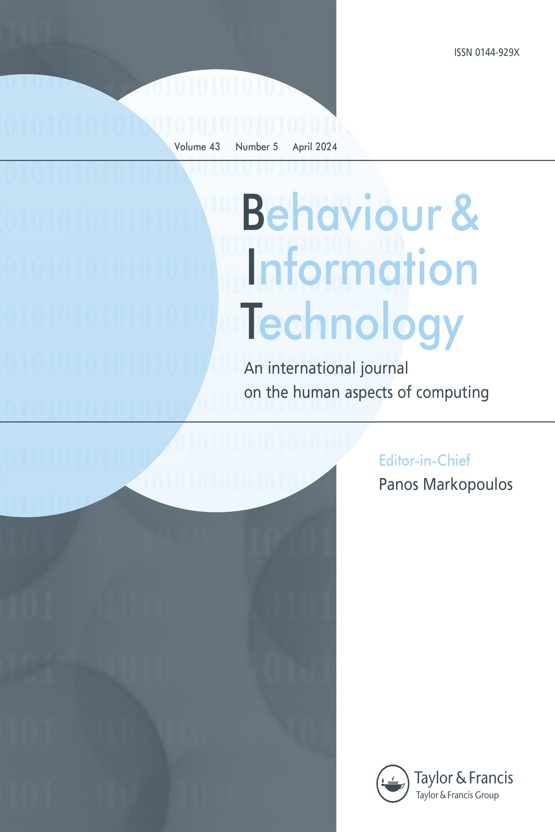Submit a Manuscript to the Journal
Behaviour & Information Technology
For a Special Issue on
Aligning Technological Advancement with Ethical Standards and ESG Principles
Manuscript deadline

Special Issue Editor(s)
Jawad Abbas,
James Cook University, Australia
jawad.abbas@ymail.com
Stefano Bresciani,
University of Turin, Italy
stefano.bresciani@unito.it
Ciro Troise,
University of Turin, Italy
ciro.troise@unito.it
Aligning Technological Advancement with Ethical Standards and ESG Principles
The rapid advancement of Artificial Intelligence (AI) has emerged as an omnipresent force (Dong et al., 2024), influencing and molding several facets of global societies (Corkin et al., 2024). AI has infiltrated diverse areas such as healthcare (Zahlan et al., 2023), banking (Kar and Kushwaha, 2023), education (Abulibdeh et al., 2024), entertainment (Abulibdeh et al., 2024), etc., demonstrating its capacity to transform our lifestyles, occupations, and social interactions (Bravo et al., 2024). This technological leap has brought about unprecedented opportunities (Chaudhary et al., 2024). Still, it has also underscored the pressing need to align AI advancements with ethical standards and Environmental, Social, and Governance (ESG) principles. The timing for such a debate is not only suitable but also pressing. In an era where technology transcends borders, cultures, and languages, the ethical implications of AI deployment have become increasingly paramount. The pervasive influence of AI technologies raises critical questions about their impact on societal values (Jeong and Gong, 2024), inclusivity, and cultural diversity (Chi et al., 2023). It is imperative to recognize the urgency of aligning these advancements with ethical considerations and ESG principles, ensuring that the benefits of AI are realized without compromising fundamental human values.
The global impact of AI is evident in its transformative influence across industries and societies (Zhang et al., 2024). However, this widespread integration has also unveiled challenges, particularly regarding bias (Stahl and Eke, 2024), discrimination (Burton, 2023), and the potential perpetuation of existing societal inequalities (Gil-Hernández et al., 2024), which can undermine trust in technology. As we delve into the opportunities AI presents, it is crucial to recognize its potential to foster equity, inclusivity, and cultural diversity. Envision educational tools customized to suit individual learning styles, healthcare systems adapted to cater to various populations, and communication platforms fostering intercultural comprehension. AI-powered accessibility solutions can enhance the capabilities of those with disabilities (Spoladore et al., 2023), while language translation technologies can effectively overcome obstacles in communication (Just, 2024). Recent, real-world cases offer a nuanced understanding of the impact of AI on different cultures and industries. For instance, the use of AI in hiring processes has been scrutinized for perpetuating biases (Keppeler, 2024), reflecting societal prejudices in algorithmic decision-making. Simultaneously, AI-driven language translation technologies have enabled cross-cultural communication, breaking linguistic barriers and fostering global collaboration (Alshahrani et al., 2024). The challenges and opportunities from these cases underscore the complex nature of integrating AI into diverse cultural contexts. Addressing these challenges requires a comprehensive examination of the ethical dimensions inherent in AI applications and a commitment to aligning technological advancements with ESG principles.
This special issue aims to unravel the intricate interplay between integrating AI technologies, ethical challenges, and ESG values, addressing a critical need in contemporary technological discourse. By exploring this intersection, we seek to understand how AI technologies, aligned with ESG principles and ethical considerations, can contribute to a more equitable and sustainable technological landscape. We invite experimental, conceptual, theoretical, and empirical studies that explore the convergence of AI technologies in shaping societies, AI and ethical challenges, ESG principles and AI solutions, and similar ones. Scholars are encouraged to submit their manuscripts matching the following questions;
- How do cultural differences shape ethical considerations in developing and deploying AI technologies across global societies?
- In what ways do diverse cultural values influence the acceptance and resistance to AI applications in different regions?
- How can AI developers navigate cultural variations to ensure inclusivity and avoid biases in algorithmic decision-making?
- What role does cultural sensitivity play in designing and implementing AI solutions that align with ESG principles?
- How do cultural perceptions of privacy impact the adoption and ethical use of AI technologies in various societies?
- What are the ESG implications of AI-driven innovations in industries across culturally diverse regions?
- How can AI contribute to preserving and promoting cultural diversity while addressing global challenges in Society 5.0?
- To what extent do cultural considerations influence the design and implementation of AI-powered solutions for societal well-being?
- How do ethical frameworks vary across cultures, and how can they be standardized to ensure responsible AI development globally?
- What are the societal impacts of AI technologies in culturally rich environments, and how can they be leveraged for positive social change?
Submission Instructions
- Opening of the submission portal: December 01, 2024
- Submission deadline: June 30, 2025
- Final review of manuscripts: December 31, 2025
- Article Publication: March 31, 2026
- Volume Number Assignment: July 2026
